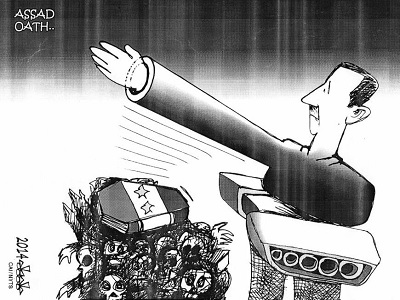A dispossessed Palestinian advises a refugee from Syria

Whenever the word “refugee” is uttered, I think of my mother. When Zionist militias began their systematic onslaught and “cleansing” of the Palestinian Arab population from historic Palestine in 1948, she, along with her family, ran away from the once peaceful village of Beit Daras.
Back then, Zarefah was 6. Her father died in a refugee camp in a tent provided by the Quakers soon after he had been separated from his land. She collected scrap metal to survive.
My grandmother, Mariam, would venture out to the “death zone” that bordered the separated and newly established state of Israel from Gaza’s refugee camps to collect figs and oranges. She faced death every day. Her children were all refugees, living in shatat — the Diaspora.
My mother lived to be 42. Her life was tremendously difficult. She married a refugee, my dad, and together they brought seven refugees into this world — my brothers, my sister and myself. One died as a toddler, for there was no medicine in the refugee camp’s clinic.
No matter where we are, in time and place, we carry our refugee identification cards, our undefinable nationalities, our precious status, our parents’ burden, our ancestors’ pain.
In fact, we have a name for it. It is called waja’ — aching — a character that unifies millions of Palestinian refugees all across the globe. With our refugee population now dominated by second, third or even fourth generation refugees, it seems that our waja’ is what we hold in common most.
Our geographies may differ, our languages, our political allegiances, our cultures, but ultimately, we meet around the painful experiences that we have internalized throughout generations.
My mother used to say “ihna yalfalastinieen damitna qaribeh” — tears for us Palestinians are always close by. But our readiness to shed tears is not a sign of weakness, far from it. It is because throughout the years we managed to internalize our own exile, and its many ramifications, along with the exiles of everyone else’s. The emotional burden is just too great.
We mask the unbearable aching somehow, but it is always close to the surface. If we hear a single melody by Marcel Khalifeh or Sheikh Imam, or a few verses by Mahmoud Darwish, the wound is as fresh as ever.
Most of us no longer live in tents, but we are reminded of our refugee status every single day, by the Israeli occupation, by the Gaza siege and the internally displaced Palestinians in Israel, by the Iraq War and the displacement of the already displaced Palestinians there, by the despicable living conditions of Palestinian refugees in Lebanon, and throughout the Middle East.
But for us, Syria has been our greatest waja’ in years. Aside from the fact that most of Syria’s half million Palestinian refugees are on the run again, living the pain of displacement and loss for the second, third or even fourth time. Nine million Syrian refugees are now duplicating the Palestinian tragedy, charting the early course of the Palestinian Nakba, the catastrophe of 1948.
Excerpts from A dispossessed Palestinian advises a refugee from Syria – Ramzy Baroud Japan Times










































0 Comments